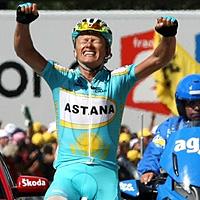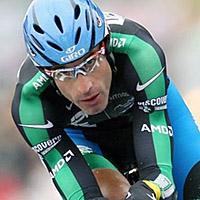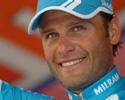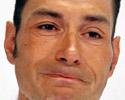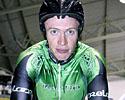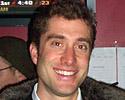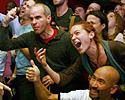First Edition Cycling News, December 8, 2007Edited by Laura Weislo Vinokourov shuts the door on cycling
Alexander Vinokourov confirmed his retirement in a press conference on Friday, one day following the Kazakh national cycling federation handing him a one year ban for blood doping. "I am stopping competition ... It's a definitive decision," he said according to AFP. "I don't want this sport anymore ... I'm slamming the door and I'm leaving." Vinokourov went on to argue that other sports weren't treated the same as cycling. "I don't think cycling is dirtier than any other sport," he said. "We're 150 people, where are the others? Where is tennis, where is football? They've been told not to touch them," he continued. "I have the impression that cycling is an orchestra with very good musicians but a bad conductor. That's the reason the sport is a mess." The 34 year-old was sacked by his Astana team following a positive test for a homologous blood transfusion performed on samples taken following the Tour de France stage 13 time trial which Vinokourov won by more than a minute over Australian Cadel Evans. The news of the positive test led his team to withdraw from the Tour. The next week, an out of competition test on Vinokourov's team-mate Andrey Kashechkin gave a similar positive test. Both riders were fired by the team, but both riders maintain their innocence. Kashechkin is in the process of suing the UCI for violating his 'human rights' for performing the out of competition test while he was on holiday with his family. Vinokourov has vowed to fight to clear his name despite his retirement. "It's sad that my career is ending like this but I want to restore my honour ... I will prove that I'm not guilty and get the results of this test rescinded," he said. He also indicated that he would appeal his one year suspension in face of a fight from WADA to appeal what it views as a light sentence to the Court of Arbitration for Sport. The Kazakh rider claimed a European bias for his predicament, saying that the nationally funded team met with opposition from the Europeans. "When we built the Astana team people started to talk behind our backs asking where are these Kazakhs coming from?" he said. "They told us they didn't want us in Europe." George Hincapie: Heading to new pastures
Retaining motivation is a test for every rider towards the end of their careers. George Hincapie has been competing for longer than many in the professional peloton but, thanks to a change of scenery, he's determined to have a strong season in 2008. Cyclingnews' Shane Stokes spoke to the American about his move to Team High Road. It takes a considerable amount of courage to change a decade-long pattern. Eleven years isn't quite a lifetime, but George Hincapie has been with the US Postal Service/Discovery Channel setup for all of that time, making it the team of choice for the bulk of his 14 year pro career. 2008 will be different. The now 34 year-old rider is changing teams for only the second time in the period since he joined the paid ranks with Motorola in 1994, choosing earlier this year to strike out on a new path rather than play it safe. At the time that rumours first surfaced that he'd be joining T-Mobile [now Team High Road], the Discovery management was still sounding positive about the chances of continuing with a team in 2008. Hincapie could have waited – and probably would have ultimately been offered a job by Johan Bruyneel on Astana - but he wanted to try something new. "I've been on the same team for a long time," he said, speaking about his decision to leave Bruyneel and the others in the Discovery Channel group. "I was always wondering what else was out there. Then Bob [Stapleton] came along with T-Mobile and his vision for cycling, which was very attractive to me. We started chatting about it and I just thought it would be a great place for me to go." Milram 2007: A season of highs and lowsBy Susan Westemeyer
The sport of cycling had an extraordinarily turbulent year full of highs and lows in 2007, and one team which rode the waves from peak to trough was Team Milram. The team sailed on the shoulders of its one man show, sprinter Alessandro Petacchi, who took a massive 17 of the team's 25 wins into the heart of the spectre of doping, which swept through the entire peloton, not sparing the Italian-German squad. Petacchi, in between wins, spent time under suspension for a 'non-negative' test, while its other sprinter Erik Zabel tearfully confessed to EPO use in 1996. Even the team management came under fire, as team manager Gianluigi Stanga was accused of having introduced a young Jörg Jaksche to doping in the mid-90s. The team's star sprinter, 'Ale-Jet' Petacchi went into the season with full force after an injury-plagued 2006, winning the GP Costa degli Etruschi for the third year in a row. After being relegated in the first stage of the Volta ao Algarve, he went on to win the third, fourth and fifth stages, as well as the overall title. He was unable to hold the good form for Milano-Sanremo, where he faded to eighth in the final sprint. Other Milram riders had success in the early season as well. Mirco Lorenzetto brought in his first pro victory in the early part of the year, winning a stage in the Tour Méditerranéen to nab one of only three wins all season by a rider other than Petacchi or Zabel. Former World Champion Igor Astarloa, who had been brought in as a third team captain, finished third in a stage of that same race, for his highest finish in a disappointing season. Over the summer he was diagnosed with toxoplasmosis and missed much of the season. In contrast to its strong start, Milram's Spring Classics were a bit of a disaster as the team was struck by an unbelievable streak of injuries and illness. With the exception of Marcel Sieberg's second-place finish behind Tom Boonen in Kuurne-Bruxelles-Kuurne, the team failed to score after much of the team succumbed to injury or illness. Fabio Sacchi and Marco Velo fell victim to the "Slaughter on the Kemmelberg" at Gent-Wevelgem. Elia Rigotto, Volodymyr Dyudya, Alberto Ongarato and Fabio Sabatini also had to miss races due to crash injuries, while Dennis Haueisen underwent emergency stomach surgery. Even "Iron man" Zabel had to miss Gent-Wevelgem and Paris-Roubaix after crashing out of the Ronde van Vlaanderen. Things began to look up again in April, as Petacchi once again put his stamp on the International Niedersachsen Rundfahrt. He was unable to win all five stages as he did last year, but won the first, second and fourth stages to take the overall win. The wins gave him confidence heading into the Giro d'Italia, where he proved to himself and to the world that he had fully recovered from his injuries of the previous season. He won the third stage and burst into tears of joy. He followed it up with wins in the seventh , eleventh, eighteenth and twenty-first stages, also taking home the best sprinter's jersey. Milram falls on hard times
Following the team's highest highs came the team's lowest of lows. It started with Erik Zabel's tearful confession which understandably was met with consternation by his team. His future with the team appeared to be in jeopardy, although finally an agreement was met to let him stay. He then went on to win two stages in the Bayern Rundfahrt. But worse was to come. In mid-June, three 'non-negative' tests from the Giro were announced and one of them was Petacchi, who had shown traces of Salbutamol, an asthma medication. Although he has an exemption to use the medication, his levels were above the legal limit for the drug, and the team was forced to suspend him the end of June until his case could be reviewed by CONI, causing him to miss the Tour de France. A further blow was dealt to team management when Jörg Jaksche told the Spiegel magazine that Stanga had introduced him to EPO while at Team Polti in 1997. Stanga denied the charges, but the damage had been done. With Petacchi absence, the team wasn't able to accomplish much in the Tour. Sieberg wore the red numbers of the most aggressive rider for one day, and Zabel was able to claim "his" green jersey for one day, but it gained no stage wins during the Tour. The Vuelta was more successful, mainly due to Petacchi's return to the peloton. Zabel took one stage and Petacchi two in a row. The speedy Italian then closed the season on a high note, winning Paris-Tours. The season's turmoil wasn't over, though. The decision to keep Zabel wasn't finalized until November, after he had indicated the possibility of returning to T-Mobile. And in a bigger change, the team announced that it had bought out the contract with general manager Stanga and that business manager Gerry van Gerwen would become the new manager, with the team license changing from Italian to German. New national record for O'LoughlinBy Shane Stokes
David O'Loughlin made a strong improvement to his 14 month-old Irish national individual pursuit record on day one of the World Cup in Beijing on Friday. The Mayo rider covered the 4000m distance in 4 minutes 25.31 secs. This was over 4.5 seconds quicker than the 4 minutes 29.909 mark he set in Newport on September 29th 2006, and was good enough for seventh overall out of the 30 riders in the competition. The Team Pezula rider has made strong progress since the world track championships in Palma last March. He was 17th there, completing the distance in 4 minutes 30.595 seconds, and can thus be satisfied with his latest showing. World and Olympic champion Bradley Wiggins won the event, recording 4'25.316 after a 4'22.69 qualifyer, edging out Volodymyr Dyudya (Ukraine) by 0.5 seconds in a close-run final. Alexander Serov (Russia) took bronze in a time of 4 minutes 26.240, just 0.109 faster than the highly promising US teenager Taylor Phinney. Legeay resigns from AIGCPCrédit Agricole general manager Roger Legeay resigned Friday from his position as vice president of the AIGCP (International Association of Professional Cyclists), citing difficulties of enforcing the ethics code signed by the teams to combat doping. Legeay is the second leader to resign for the organization after Patrick Lefevere left the president's post, citing the conflict between the UCI and Grand Tour organizers as his reason for quitting. Legeay's team was one of the founders of the 'Mouvement pour un cyclisme crédible' (Movement for credible cycling, MPCC), and said in a letter to the AIGCP that he felt his position with the association had become "incompatible" with the philosophy of the MPCC, according to AFP. Rheinland-Pfalz Rundfahrt organizing committee dissolvedDoping has claimed another victim, as the organizers of the Rheinland-Pfalz Rundfahrt this week announced that they were dissolving their organizing committee. The organization had announced in July that the race would not take place in 2008, stating: "Due to the doping disclosures of the last few days and weeks, the provincial government in Mainz has cancelled the governmental funds for the Tour next year." Now the committee said that it had dissolved its organization in order to save funds, thus canceling all chances of a race the coming year. The apparently last edition of the race was held this past May and was won by T-Mobile Team's Gerald Ciolek. Over the years, the race has been won by such well-known names as Dieter Koslar (1971), Theo de Rooy (1978), Olaf Ludwig (1985 and 1996), Mario Kummer (1987), Christian Henn (1988), Kai Hundertmarck (1990), Cédric Vasseur (1994), Lance Armstrong (1998), Erik Dekker (2001) and Michael Rich (2005). Sinkewitz not alone in blood doping in 2006Patrik Sinkewitz had previously said that he drove alone on the night of July 1, 2006, after the first stage of the Tour de France, from Strasbourg, France, to the University Clinic in Freiburg, Germany, for an illegal blood transfusion. But it must have been more of a convoy, as "at least" five T-Mobile riders went in that night for blood-doping, according to the Saturday edition of the Stuttgarter Zeitung. The paper claims to have seen documents from the University Clinic which shows that the riders received re-transfusion of their own blood on the evening of the Tour's prologue. Deutsche Telekom spokesman Christian Frommert told the newspaper that he was not surprised by the claim, and that he had always known that Sinkewitz couldn't have been the only one on the team practicing blood doping. German anti-doping crusader Werner Franke said, "Everyone can look and see who was strong in the individual time trial", which was held one week later. T-Mobile placed six riders in the top 16, with Serguei Gonchar winning the time trial. Of the seven riders who started the Tour for T-Mobile in 2006, only Michael Rogers (Team High Road) and Andreas Klöden (Team Astana) are still riding in the ProTour. Giuseppe Guerini ended his career this season. Serguei Gonchar was released by Team T-Mobile during the season and is said to have signed for the Continental Team Preti Mangimi (formerly Kio-Ene-Tomazzo-DMT) for the coming season. Eddy Mazzoleni resigned from Team Astana after being named in the "Oil for Drugs" scandal, and Matthias Kessler (Astana) and Sinkewitz were both fired after testing positive for testosterone this season. Jan Ullrich and Oscar Sevilla were suspended from the team the day before the Tour was to start, after being named in the Operación Puerto doping scandal. Liquigas heads to SpainThe Liquigas team will head to Benicásim, Spain for its second informal team camp on December 10-19. 29 riders from the blue and green team will get back together after it's time at the Salsomaggiore Terme in Italy last week to plan for next season and work on team dynamics. Team manager Stefano Zanatta will lead the camp along with Mario Scirea and Paolo Slongo. "After the check made in Salsomaggiore Terme it's high time to get into the saddle again," Zanatta explained. "We will spend ten important days to plan the new season and to cement the understanding between riders and technical staff." The team will split into two groups at the camp: one focused on the early season and other riders hoping to perform well later. "We will dedicate a special care to the group including Bennati, Pozzato and Chicchi," Zanatta continued. "These are the riders expected to have a good start of the season; for them we have already planned a specific work." T-town's best spin for the CRCA
Lehigh Valley Velodrome/Valley Preferred Cycling Center CEO Erin Hartwell and some of 'T-town's' fastest legs descended upon a midtown Manhattan roller racing party to help raise funds for the CRCA's junior program. Hosted by NYvelocity.com, the event attracted the likes of Christian Vande Velde, who brought a jersey to auction off, and Andy Lakatosh and Ben Barczewski who went head to head with New York locals to raise money for the city's oldest cycling clubs. T-town's Matt Diefenbach set the record for fastest qualifying time, completing 500 meteres in under 16 seconds. The top sixteen times advanced to elimination rounds, and the event organizers entertained the crowd with a 1km/1 beer challenge won by Dave Perry of Bike Works over nyvelocity's Andy Shen and Dan Schmalz.
Serious racing resumed, and after two rounds of 1k elimination races, the semifinals were set. Not surprisingly, the four spots were claimed by T-Town's Diefenbach, Andy Lakatosh, Ben Barczewski, and Kasper Jessen, with Barczewski and Jessen advancing to the finals. The two women racers took on the men, then squared off for the women's title, taken by Melissa O'Reilly over Tara Parsons. Jessen and Barczewski settled in for the final after a pugilistic entrance. The final was a nip and tuck affair, with Jessen just nipping Barczewski for the win. Jessen then showed off his guns in his sleeveless Toto jersey and drenched the crowd with Pacifico.
PhotographyFor a thumbnail gallery of these images, click here Images by Eugene Boronow
Images by Marco Quesada
(All rights reserved/Copyright Future Publishing (Overseas) Limited 2007) |

|
January 2009 |
Recently on Cyclingnews.com |

